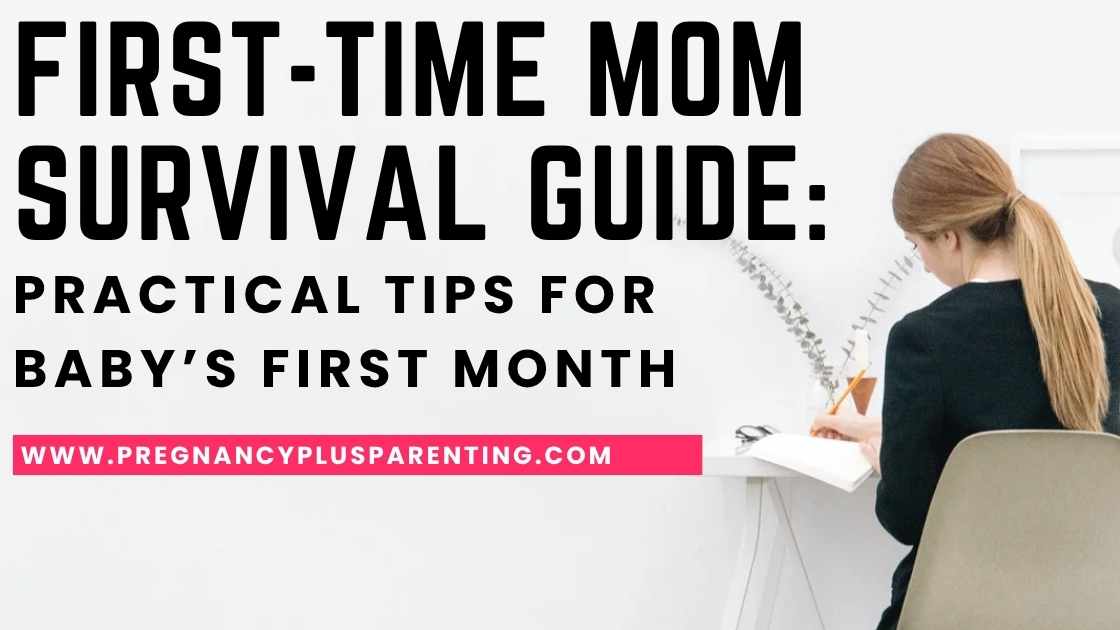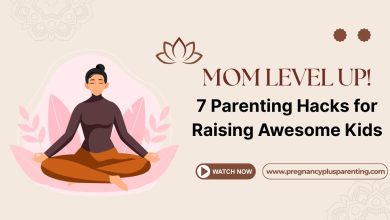First-Time Mom Survival Guide: Practical Tips for Baby’s First Month
Gentle, joyful, and practical guidance for new mothers
Introduction
Becoming a first-time mom is a life-changing journey filled with immense joy, tender moments, and, at times, overwhelming challenges. The first month after bringing your newborn home is particularly intense, as you learn to navigate feeding, sleep, diapering, and bonding while adjusting to your new role.
There is no manual for motherhood, but having a practical survival guide can ease anxiety and help first-time moms feel confident and prepared. This article provides comprehensive guidance, combining gentle strategies, realistic expectations, and actionable tips for the first 30 days of life with your baby.
1. Preparing for the First Month
Before your baby arrives or within the first week at home, preparation is key. Having the essentials organized reduces stress and allows you to focus on bonding with your newborn.
Essentials to Prepare:
-
Feeding supplies: Bottles, breast pump, formula, burp cloths
-
Diapers & wipes: Newborn-sized, diaper cream, changing mat
-
Clothing & blankets: Onesies, sleepers, hats, mittens, swaddles
-
Health & safety: Thermometer, nasal aspirator, baby lotion, nail clippers
-
Sleep setup: Bassinet or crib, fitted sheets, swaddling blankets
Pro tip: Create a small, organized newborn care station near your primary resting area for easy access.
2. Understanding Your Baby’s Needs
The first month is a learning curve for both baby and mother. Recognizing basic newborn needs helps you respond confidently.
Newborn Needs Include:
-
Feeding: Every 2–3 hours on demand
-
Sleep: Short naps of 2–4 hours; total 14–17 hours per day
-
Comfort: Skin-to-skin contact, gentle rocking, or swaddling
-
Hygiene: Frequent diaper changes, sponge baths, umbilical cord care
-
Stimulation: Soft talking, singing, or eye contact during wake periods
Pro tip: Observe cues—crying, yawning, or rooting—to determine what your baby needs rather than relying solely on the clock.
3. Feeding Survival Tips
Feeding can be one of the most stressful areas for first-time moms, especially when navigating breastfeeding or formula feeding.
Breastfeeding Tips:
-
Feed on demand and avoid rigid schedules in the first month
-
Watch for hunger cues: sucking on hands, rooting, fussiness
-
Ensure proper latch to prevent soreness and maintain milk supply
-
Stay hydrated and rest when possible
Formula Feeding Tips:
-
Prepare bottles according to instructions and sterilize all equipment
-
Feed every 3–4 hours or based on your baby’s hunger cues
-
Hold baby upright during feeds and burp afterward
Pro tip: Keep a feeding journal noting times, amounts, and reactions to help monitor growth and patterns.
4. Mastering Diapering and Hygiene
Newborns require frequent diaper changes—8–12 per day in the first month. Maintaining cleanliness is crucial for comfort and health.
Diapering Essentials:
-
Stock up on newborn diapers and wipes
-
Keep diaper cream accessible to prevent rashes
-
Wash hands thoroughly before and after changes
Bathing & Skin Care:
-
Begin with sponge baths until the umbilical cord stump falls off
-
Use lukewarm water and mild, fragrance-free soap
-
Apply gentle lotion for dry skin if needed
Pro tip: Fold diapers below the umbilical cord stump to avoid irritation and infection.
5. Sleep Strategies for Newborns
Sleep is essential but often elusive for first-time moms. Understanding newborn sleep patterns helps create a calm environment.
Newborn Sleep Facts:
-
14–17 hours per day in short, 2–4 hour stretches
-
Back sleeping is safest to reduce SIDS risk
-
Room-sharing with parents for the first six months is recommended
Sleep Tips for Moms:
-
Dim lights during night feeds
-
Use white noise or soft lullabies
-
Recognize sleepy cues and place baby in crib or bassinet promptly
Pro tip: Avoid overstimulation at night to help your baby differentiate between day and night.
6. Bonding and Emotional Connection
Bonding is the foundation of a secure parent-child relationship. The first month offers countless opportunities for emotional connection.
Bonding Activities:
-
Skin-to-skin contact during feeding or quiet time
-
Gentle talking, singing, or humming
-
Eye contact and soft touch during wake periods
-
Short baby massages to stimulate circulation and relaxation
Pro tip: Even brief moments of focused attention strengthen attachment and comfort your newborn.
7. Coping with Crying and Fussiness
Crying is your baby’s primary way of communicating. First-time moms often feel anxious when their newborn cries.
Common Causes:
-
Hunger or thirst
-
Dirty diaper
-
Sleepiness or overstimulation
-
Discomfort due to temperature or clothing
Soothing Techniques:
-
Hold and gently rock your baby
-
Offer a pacifier
-
Swaddle snugly for security
-
Use white noise or gentle shushing
Pro tip: Stay calm—babies can sense stress, and your calm response helps soothe them.
8. Establishing a Routine (Without Pressure)
A flexible routine helps you anticipate your newborn’s needs while avoiding rigidity.
Sample First-Month Routine:
-
Feeding: On-demand every 2–3 hours
-
Diapering: As needed, usually before and after naps
-
Sleep: Encourage safe sleep in a calm environment
-
Bonding: Short interactive periods throughout the day
-
Parental rest: Sleep during baby naps, ask for help when needed
Pro tip: Routine is about predictability, not strict schedules. Each baby has unique rhythms.
9. Organizing Your Home for the First Month
Creating a supportive environment reduces stress and allows focus on your baby.
Organization Tips:
-
Create a newborn care station with diapers, wipes, clothing, and feeding supplies
-
Keep essential items in multiple locations: nursery, bedroom, and living area
-
Prepare meals in advance or use delivery services
-
Accept help from family or friends for household chores
Pro tip: Simplify life—prioritize what’s essential and avoid unnecessary tasks.
10. Parental Self-Care and Mental Health
New motherhood can be exhausting. Caring for yourself is just as important as caring for your baby.
Self-Care Tips:
-
Sleep when the baby sleeps to recover energy
-
Eat balanced meals and stay hydrated
-
Take short breaks for mental relaxation or light exercise
-
Accept emotional support from loved ones or postpartum groups
Pro tip: Postpartum mood changes are normal. Seek professional help if you experience persistent sadness, anxiety, or overwhelming stress.
11. Monitoring Your Baby’s Health
The first month is critical for monitoring growth and development.
Health Checklist:
-
Monitor feeding, output, and weight gain
-
Observe skin color, jaundice, rashes, or unusual behavior
-
Check temperature and breathing patterns
-
Attend all recommended pediatric appointments
Pro tip: Keep a log of feeding, diapering, and sleep to help your pediatrician track your baby’s progress.
12. First-Month Milestones
Even in the first month, babies show remarkable development.
Common Milestones:
-
Responding to voices and gentle touch
-
Lifting head briefly during tummy time
-
Showing reflexes: grasp, rooting, startle
-
Establishing sleep-wake cycles gradually
Pro tip: Celebrate small milestones; each baby develops at their own pace.
13. Practical Tips for First-Time Moms
-
Accept that perfection is unrealistic; flexibility is key
-
Keep essentials within reach for quick response
-
Use a diaper bag stocked with necessities for short outings
-
Limit visitors if it helps maintain calm and reduces overstimulation
Pro tip: Trust your instincts—your baby knows you best.
14. Emotional Joy and Bonding Moments
The first month is full of tender and magical moments:
-
First smiles or coos
-
Baby recognizing your voice
-
Holding your baby skin-to-skin after a long day
-
Family bonding sessions with siblings or grandparents
Pro tip: Take photos, videos, or journal moments—these memories pass quickly but leave lifelong joy.
Conclusion
The first month as a first-time mom is a journey of love, learning, and adaptation. While challenges like sleepless nights and constant care are real, embracing practical strategies, flexible routines, and self-care allows both you and your baby to thrive.
By focusing on feeding, sleep, hygiene, bonding, and parental well-being, you create a nurturing environment where your newborn feels secure, loved, and comfortable. Remember, there is no “perfect” way to parent. Patience, observation, and love are your most powerful tools.
Cherish these early days—they are fleeting, full of firsts, and deeply rewarding. With preparation, guidance, and gentle care, the first month can become a foundation for a lifetime of healthy habits, growth, and connection.






